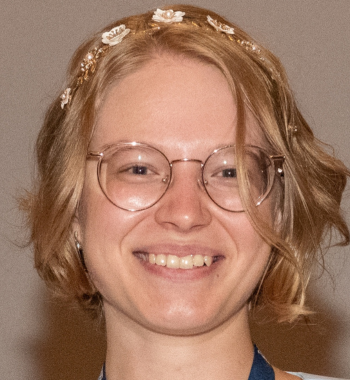 Elena Esina
Elena Esina
University of Ottawa
Tell us a bit about your scientific and educational background.
I hold an Honours Bachelor of Science degree in Biomedical Science with an option in Cellular and Molecular Medicine from the University of Ottawa. Currently, I am pursuing a Master’s degree in Biology with a specialization in Bioinformatics under the supervision of Carole Yauk (University of Ottawa) and Francesco Marchetti (Health Canada and Carleton University). My research focuses on using error-corrected next-generation sequencing (ecNGS) to study the mutational characteristics of aging in mouse liver and bone marrow tissues.
As part of this research, I have conducted power analyses to optimize study designs for ecNGS mutation analysis for diverse experimental questions.
What do you see as the greatest value or most rewarding aspect of your scientific work?
I love the creative aspect of science and the thrill of discovery. Every experiment and study is a step into the unknown, and the most rewarding aspect of it is knowing that uncovering new knowledge and understanding has the potential to make a positive impact on society and lead to tangible improvements in people’s lives.
What initially drew you to the EMGS?
Protecting our genome is essential for safeguarding human health from harmful exposures – that’s why research in this area is so important. What really drew me to EMGS is the amazing community of scientists all working towards this shared goal. The dedication and collaboration within this community is truly inspiring, and I am excited to be a part of it.
How has EMGS impacted your professional development?
The 2024 EMGS Annual Meeting was a pivotal moment in my professional development as it was my first chance to officially engage with the scientific community. I had the opportunity to present my research findings and interact with numerous experts, exchanging ideas, gaining fresh perspectives, and broadening my knowledge. It helped me gain confidence in presenting and discussing my work, which will be invaluable for my thesis development and defense.
On a more personal note, seeing my mentors in action at the conference was incredibly inspiring. Watching them navigate discussions, present their work, and engage with others showed me the level of professionalism and passion required to excel in this field. It served as a great reminder of why I love this field and the people in it.
What advice would you offer to students or early career investigators?
Although I haven’t been a part of EMGS for long, my advice would be to take advantage of the unique chance it provides to actively network with a cross-sector community of experts in the field. As a small society, there are many opportunities to contribute, meet new collaborators, and make lasting friendships. By getting involved, you can gain valuable insights, find mentors, and stay updated on the latest research and developments in the field.
 2025 EMGS Program Chair
2025 EMGS Program Chair